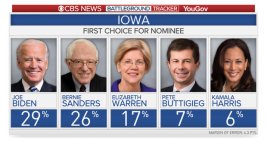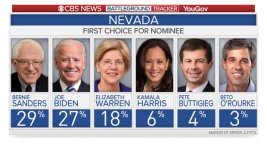The independent vote is routinely overestimated by Democrats
Nonsense.
Do you ever stop and ask yourself why the GOP was so successful in smearing Kerry?
They lied and paid off veterans to lie about his record! Their strategy has even become a
term of art ffs describing exactly that. Iow, they
swiftboated him.
Could it be that he had no redeeming qualities other than his reputation
Wow. And, just for fun, how exactly did he get "his reputation" if he had no redeeming qualities?
But, more importantly, are you seriously suggesting that Bernie Sanders is a saint? Or that he's beyond being
swiftboated? Love him or loath him,
Eichenwald put it best:
It is impossible to say what would have happened under a fictional scenario, but Sanders supporters often dangle polls from early summer showing he would have performed better than Clinton against Trump. They ignored the fact that Sanders had not yet faced a real campaign against him. Clinton was in the delicate position of dealing with a large portion of voters who treated Sanders more like the Messiah than just another candidate. She was playing the long game—attacking Sanders strongly enough to win, but gently enough to avoid alienating his supporters. Given her overwhelming support from communities of color—for example, about 70 percent of African-American voters cast their ballot for her—Clinton had a firewall that would be difficult for Sanders to breach.
When Sanders promoted free college tuition—a primary part of his platform that attracted young people—that didn't mean much for almost half of all Democrats, who don't attend—or even plan to attend—plan to attend a secondary school. In fact, Sanders was basically telling the working poor and middle class who never planned to go beyond high school that college students—the people with even greater opportunities in life—were at the top of his priority list.
So what would have happened when Sanders hit a real opponent, someone who did not care about alienating the young college voters in his base? I have seen the opposition book assembled by Republicans for Sanders, and it was brutal. The Republicans would have torn him apart. And while Sanders supporters might delude themselves into believing that they could have defended him against all of this, there is a name for politicians who play defense all the time: losers.
Here are a few tastes of what was in store for Sanders, straight out of the Republican playbook: He thinks rape is A-OK. In 1972, when he was 31, Sanders wrote a fictitious essay in which he described a woman enjoying being raped by three men. Yes, there is an explanation for it—a long, complicated one, just like the one that would make clear why the Clinton emails story was nonsense. And we all know how well that worked out.
Then there's the fact that Sanders was on unemployment until his mid-30s, and that he stole electricity from a neighbor after failing to pay his bills, and that he co-sponsored a bill to ship Vermont's nuclear waste to a poor Hispanic community in Texas, where it could be dumped. You can just see the words "environmental racist" on Republican billboards. And if you can't, I already did. They were in the Republican opposition research book as a proposal on how to frame the nuclear waste issue.
Also on the list: Sanders violated campaign finance laws, criticized Clinton for supporting the 1994 crime bill that he voted for, and he voted against the Amber Alert system. His pitch for universal health care would have been used against him too, since it was tried in his home state of Vermont and collapsed due to excessive costs. Worst of all, the Republicans also had video of Sanders at a 1985 rally thrown by the leftist Sandinista government in Nicaragua where half a million people chanted, "Here, there, everywhere/the Yankee will die,'' while President Daniel Ortega condemned "state terrorism" by America. Sanders said, on camera, supporting the Sandinistas was "patriotic."
The Republicans had at least four other damning Sanders videos (I don't know what they showed), and the opposition research folder was almost 2-feet thick. (The section calling him a communist with connections to Castro alone would have cost him Florida.) In other words, the belief that Sanders would have walked into the White House based on polls taken before anyone really attacked him is a delusion built on a scaffolding of political ignorance.
Could Sanders still have won? Well, Trump won, so anything is possible. But Sanders supporters puffing up their chests as they arrogantly declare Trump would have definitely lost against their candidate deserve to be ignored.
And that's just how he might fare against the Trump/GOP noise machine, leaving out the effect of the Russian clandestine warfare and barely touching on the negative effects on the 75 million Democrats who wanted Hillary, not Sanders had he ever had even a ghost of a chance in the primaries and miraculously won against her.
Or do you have it as part of your fantasy that all Democrats rose up against Hillary and everyone voted only for Sanders in the primaries?
Yes, the vast majority of Dems would have voted for him in the general in the unlikely event he had managed to beat Hillary in the primaries--because unlike turncoat Sanders' supporters, Hillary supporters followed their heads not their dreams
because it's a fucking job interview, not Church--but there's no way in hell anyone could just say, "He would have received exactly the same number of votes--or MORE--than Hillary did, therefore he would have beaten Trump." She holds
the third place record ffs, having almost matched Obama's 2012 second place record and having received more raw votes than
any white President in US history.
Blacks, Hispanics, Women and untold millions of the exact middle class whites in the heartlands that Sanders bots think would have just automatically voted for him in droves in the same numbers they voted for Hillary (because they've convinced themselves that no one--not one single Dem--voted
for Hillary without holding their nose--would be the exact ones targeted to either vote against Sanders or just not to vote at all and it would have been a VERY easy sell by simply painting Sanders as he comes across; a "New York Commie Jew" out to steal your money.
And that's
before he started advocating that the Democratic party ignore blacks and hispanics and instead focus primarily on under educated white rural males and threw all Democratic women under the bus by seriously arguing that we dump abortion in order to attract pro-lifers!
Again,
why do you think the Trump camp, the GOP and the Russians all supported Sanders against Clinton?
That fact alone should tell you all you need to know about who they thought would be the easier opponent to defeat in the general, but you always avoid addressing that simple fact.
You need to stop posting for a minute and admit to yourself that it's not "the electorate" or "the independents" who will have a problem with Bernie's socialism--it's you.
Jimmy has never struck me as someone who has a problem with socialism, but I most definitely have no problem at all with anything Bernie proposed--because, as I've pointed out many times previously--it's not socialism, it's just the DNC platform that we've always run. Regardless, if you can't comprehend how Sanders would have been attacked by the right--and how easy it would have been to defeat him accordingly--then you're just following your messiah and have left the planet.
And that's fine, vote for whoever you think represents your preferences.
WRONG! It's not about YOU, it's a fucking job! It was exactly that idiotic mindset that caused many slivers to fuck us all and take their vote OFF of the solution and onto Trump!
But by far, the most energized and militant sector of the Democratic base has zero problems with it and if they come out in the numbers that have been routinely packing every Sanders campaign event, and take their reluctant blue-ballot centrist friends with them, Trump is toast
Yeah, when have we heard that exact same tautology? Oh, right, in the 2015 primaries. How did that work out?
and the independents can go back to being the irrelevant political force they've always been.
Independents outnumber Dems.




 You're not very good at this.
You're not very good at this.